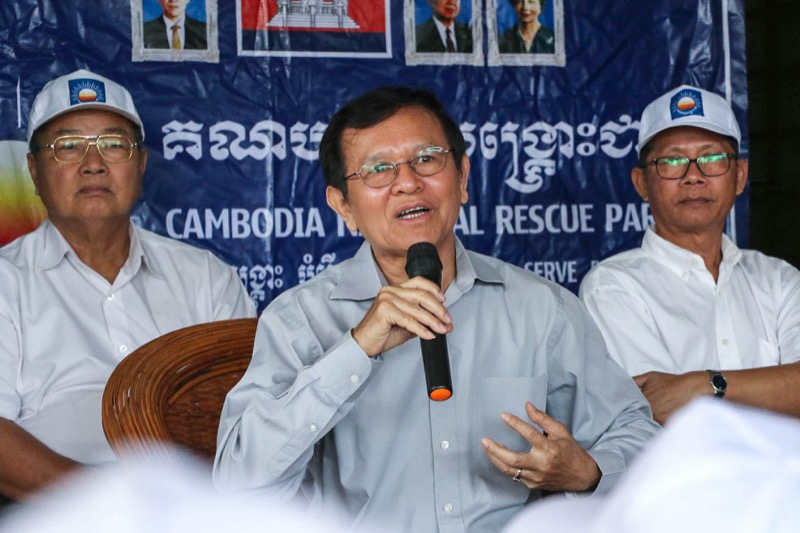A vice president for the opposition CNRP said the party would not abandon its overarching slogan for the upcoming commune elections despite a threat from the ruling CPP to sue over what it called an “insulting” message amounting to incitement.
At a ceremony marking his appointment as the CNRP’s new president on Thursday, Kem Sokha announced what he said would be the party’s main theme in the campaign leading up to the June 4 election. “Change commune chiefs who serve the party and replace them with commune chiefs who serve the people,” he said.

In a statement sent out late on Monday night, the CPP described the message as “inciting, provocative and seriously insulting” to incumbent commune councilors across the country and threatened to sue the CNRP “in case there is no correction.”
Contacted on Tuesday, CNRP Vice President Mu Sochua said the party had no intention of changing the message.
“No, we don’t plan to change,” said Ms. Sochua, who also serves as the party’s director of public affairs.
She referred additional questions to CNRP lawmaker Son Chhay, who could not be reached.
On his Facebook page, CNRP Vice President Eng Chhay Eang also struck a defiant note.
“I think this slogan just pushes and encourages commune chiefs who get support from the people during the election to serve the people and not to serve the party,” he wrote. “This slogan, they can ban the CNRP from using it, but they cannot ban the people from using it because this slogan was created by the people.”
In its statement, the CPP threatened to sue the opposition party using “existing law” but did not mention which one.
Contacted on Tuesday, CPP spokesman Sok Eysan said it would use the Law on Commune Administrative Management, which lays out the duties of commune officials. It does not prohibit general comments suggesting that commune officials are not fulfilling those duties.
The CNRP’s slogan “violates the content of the law,” Mr. Eysan said. “It’s like discrimination against the commune chiefs, who are mostly CPP. So your evaluation is against the law, and it’s an act we cannot accept.”
The spokesman declined to specify how much time his party would give the CNRP to change its slogan. “Not very long,” he said.
The CPP dominated the commune elections in 2012, winning 8,292 of the 11,459 council seats up for grabs and securing a commanding 1,592 of the 1,633 commune chief spots.
The Sam Rainsy Party and Human Rights Party, which merged later that year to form the CNRP, won a combined 2,955 council seats in 2012 and only 40 commune chief spots. Buoyed by its strong showing in the 2013 national elections, however, when it won nearly half the votes, the CNRP is expecting to do much better on June 4.
Prominent human rights lawyer Sok Sam Oeun said on Tuesday that he could think of no legitimate legal grounds on which to sue the CNRP over its slogan.
“I cannot find any legal provision for this,” he said.
Mr. Sam Oeun said commune officials by law have to be members of a political party and that the commune administration law might apply only if the CNRP meant that officials should not be party members.
“If they meant that officials do not care about the people, then it would be different,” he said, and not a breach of the law.
Cambodia’s courts are widely believed to be among the most corrupt and politicized institutions in the country, however. According to a recent report by Transparency International based on about 1,000 interviews, nearly 60 percent of those surveyed said they believed that “most or all” of those working in the judicial system were corrupt.
Local rights group Licadho currently counts 27 political prisoners in the country.
On an official visit to Cambodia last year, Tom Malinowski, the U.S.’s then-assistant secretary of state for democracy, human rights and labor, said the right to criticize those in power was fundamental to democracy.
“Defense of human rights is sometimes contentious and controversial work. It often involves criticism of the powers that be. But it is absolutely necessary to the health and stability of any democracy,” he said at a news conference.
Mr. Malinowski said recent court cases had made it clear that the judicial system was being used to target the opposition.
“It is pretty plain that over the last several weeks and months in Cambodia, the vast majority of these legal actions have been taken against one side—against people who are seen as critical of the government,” he said. “And I think that gives rise to legitimate questions of politicization of the process.”




